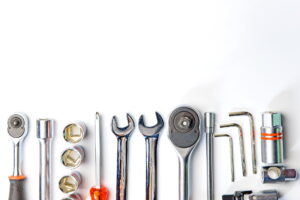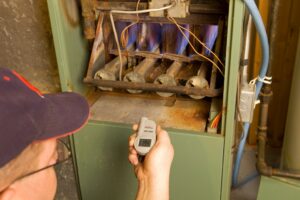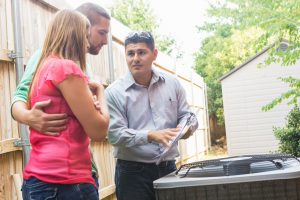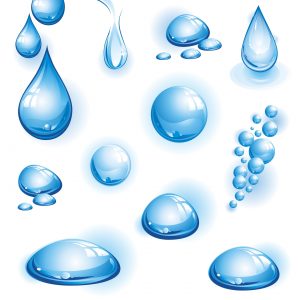 Boilers are some of the oldest and most reliable heating systems in the world. The ancient Romans used to use boiling water to heat their homes via steam and lead pipes, so there’s a very good precedent for having a boiler heat your home. In a hundred years, we’ll probably still have powerful boiler systems because they’re just that effective.
Boilers are some of the oldest and most reliable heating systems in the world. The ancient Romans used to use boiling water to heat their homes via steam and lead pipes, so there’s a very good precedent for having a boiler heat your home. In a hundred years, we’ll probably still have powerful boiler systems because they’re just that effective.
However, the type of boiler you have in your home is going to change things quite a bit. Oil boilers, for instance, are going out of style and many HVAC professionals are refusing to install them. Meanwhile, gas boilers are becoming increasingly popular and our team provides all the necessary installation services you might need.
Today, we’re going to talk about oil to as boiler conversions. We’ll discuss why it’s a popular option, and how to contact our team for any boiler services in Washington, DC that you might need.



 Electric furnaces are an interesting topic to talk about. It’s not usually the first type of furnace system that homeowners in our area tend to think about, but it’s absolutely one that we recommend for certain homes that really wouldn’t do well with a gas furnace. If your home has an electric furnace, or you’ve been thinking about upgrading your furnace to one that better suits your needs, then this could be the blog post for you.
Electric furnaces are an interesting topic to talk about. It’s not usually the first type of furnace system that homeowners in our area tend to think about, but it’s absolutely one that we recommend for certain homes that really wouldn’t do well with a gas furnace. If your home has an electric furnace, or you’ve been thinking about upgrading your furnace to one that better suits your needs, then this could be the blog post for you. We know, we know, we talk a lot about maintenance on this blog. That’s only because it’s so important! Neglecting to have maintenance done on your heating system spells disaster for your comfort, your home, and your budget going forward. But we’re not here to talk about only the vital parts of maintenance, we’re here to talk about everything. That includes the awesome perks that you could take advantage of when you join our Polar Plus Club.
We know, we know, we talk a lot about maintenance on this blog. That’s only because it’s so important! Neglecting to have maintenance done on your heating system spells disaster for your comfort, your home, and your budget going forward. But we’re not here to talk about only the vital parts of maintenance, we’re here to talk about everything. That includes the awesome perks that you could take advantage of when you join our Polar Plus Club. If you’ve been following our blog for the last few weeks, you might notice a trend. We’re taking a big step to be proactive heading into 2021, and with each blog post, we’re deciding to focus on heater maintenance. Welcome to January, heater maintenance month!
If you’ve been following our blog for the last few weeks, you might notice a trend. We’re taking a big step to be proactive heading into 2021, and with each blog post, we’re deciding to focus on heater maintenance. Welcome to January, heater maintenance month! You’d be surprised by how many homeowners opt-out of heater maintenance. Whether it’s because they think it’s unnecessary, think it’s a scam, or don’t even know what heater maintenance is, this is a bad move. It’s like opting out of oil changes for your car, or opting out of paying your bills every month. Sure, it’s your decision, but it’s far from the best one.
You’d be surprised by how many homeowners opt-out of heater maintenance. Whether it’s because they think it’s unnecessary, think it’s a scam, or don’t even know what heater maintenance is, this is a bad move. It’s like opting out of oil changes for your car, or opting out of paying your bills every month. Sure, it’s your decision, but it’s far from the best one. While we enjoy talking about our technical expertise in the field of HVAC, we get this question too much to ignore it. If you’ve landed on this page, you’re definitely on the lookout for professional HVAC services—so let’s not beat around the bush. Why would you choose us?
While we enjoy talking about our technical expertise in the field of HVAC, we get this question too much to ignore it. If you’ve landed on this page, you’re definitely on the lookout for professional HVAC services—so let’s not beat around the bush. Why would you choose us? AC maintenance is just one of those things that’s really easy to forget about. Like a bill every now and then or your car’s oil change, we forget things all the time. We’re not here to shame you for that. Far from it! We’re here to say that we understand that mentality. It’s hard to remember everything without constantly being worried or stressed out.
AC maintenance is just one of those things that’s really easy to forget about. Like a bill every now and then or your car’s oil change, we forget things all the time. We’re not here to shame you for that. Far from it! We’re here to say that we understand that mentality. It’s hard to remember everything without constantly being worried or stressed out. Air purification isn’t a simple measurement. There’s a lot of air in your home and it could be thoroughly contaminated with germs. While lighting some candles and scrubbing surfaces might help a little bit, we’ve always been at a loss as to how we could safely and effectively clean our indoor air. That is—until the UV light purifier was developed.
Air purification isn’t a simple measurement. There’s a lot of air in your home and it could be thoroughly contaminated with germs. While lighting some candles and scrubbing surfaces might help a little bit, we’ve always been at a loss as to how we could safely and effectively clean our indoor air. That is—until the UV light purifier was developed. Humidity really is the bane of our comfort during the summers. Especially when it comes to
Humidity really is the bane of our comfort during the summers. Especially when it comes to  With the winter weather wearing you down, you need to know that you have a comfortable environment waiting for you back home. That means having a heater that is capable of heating your house in an effective and dependable manner. But the truth is that no heating system is ever going to be 100% reliable. If and when your heater needs repairs, contact a member of our team right away.
With the winter weather wearing you down, you need to know that you have a comfortable environment waiting for you back home. That means having a heater that is capable of heating your house in an effective and dependable manner. But the truth is that no heating system is ever going to be 100% reliable. If and when your heater needs repairs, contact a member of our team right away.